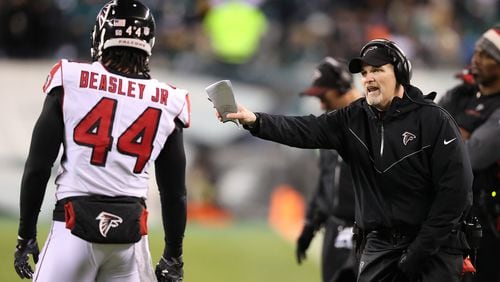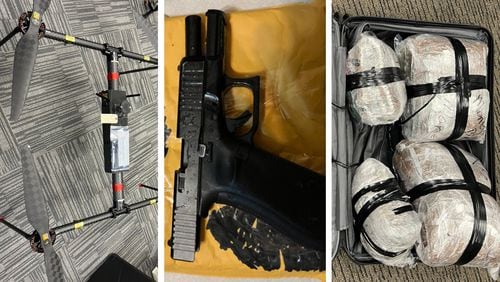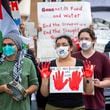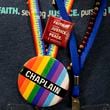Ask yourself this: Had Carson Wentz been healthy Saturday and the Falcons reduced to deploying Matt Schaub, how big would the Eagles have won? Something like 24-7, right? In your wildest dream, could you envision the Falcons doing with their backup quarterback what Philadelphia did with its? No?
So how did the Eagles win by five on a day when the quarterbacks were Matt Ryan and Nick Foles? How did the team with the 2016 MVP go pointless over the final 35 minutes and 40 seconds? How did the team recently equipped with a scorched-earth offense muster only 113 yards over the final two quarters, even as the Eagles, working with a passer who couldn’t throw the ball 10 yards downfield, managed 164?
The answer is coaching, or the absence thereof.
Knowing their limitations, the Eagles constructed a game path and clung to it like grim death. They did this even after all but handing the Falcons 10 points via turnovers. Those turnovers were all that made this a game. Left to its own devices, this once-raging offense laid a goose egg. How does that happen? How does the team with Ryan and Julio and Sanu and Freeman and Coleman accomplish next to nothing?
And what, according to Philadelphia reporters, did the Eagles yell to one another when the Falcons aligned themselves for fourth-and-goal at 2? “This is it!” they cried, meaning a rollout to the right, which it was. Outplayed and outcoached: That’s how you lose to a diminished opponent.
Even worse is this: The Falcons’ final act was no one-off. They played nine games against teams playoff qualifiers. They scored 17, 7, 17, 9, 20, 13, 22, 26 and 10 points. They lost six of the nine. They managed 11 touchdowns over those nine games, kicking 19 field goals. If we didn’t see what happened in Philly coming, it was only because we weren’t paying attention.
In preseason, Pro Football Focus rated the Falcons’ roster the NFL’s most talented? How often was that talent brought to bear? Against Green Bay – that’s one time. Against Seattle – there’s two. I’m less impressed by the Dallas victory because it was accomplished against a team missing its best player, but feel free to include it. The victory over the Saints was a halting thing (Matt Ryan threw three interceptions), and the playoff clincher against Carolina was a function of Matt Bryant’s foot. The Wild Card showing against the Rams qualifies, even though the Falcons were outgained.
But if we count how many Falcons’ victories could easily have been otherwise -- Bears, Lions, Saints here, Buccaneers there – it’s nearly a wash between shaky victories and stirring performances. A year ago, we got the sense that the Falcons were on to something as early as October. We were never sure what to make of them this time, which is why bowing out against Nick Foles was no seismic shock. This team wasn’t very good very often, and then only in fits and starts.
Without Kyle Shanahan, an offensive regression was inevitable. What came was a collapse. Julio Jones, the NFL’s best receiver, caught four touchdown passes in 18 games. (Mohamed Sanu caught more.) Taylor Gabriel, exploited to great effect by Shanahan last season, slipped from six touchdowns to one. Ryan threw for 849 fewer regular-season yards. The Falcons scored 11 touchdowns in their final seven games; one of those was on a fumble recovery in the end zone.
If the argument for keeping Steve Sarkisian as offensive coordinator is that Shanahan’s first year here wasn’t very good, either, we need to note: Shanahan at least had a history as an NFL play-caller. Sarkisian inherited one of the 10 best offenses in NFL history and rendered it toothless. That’s an “F.”
The defense was better statistically than in the Super Bowl year, but this defense couldn’t get off the field in the second half in Philly. Vic Beasley Jr. went from NFL sack leader to forgotten man. Desmond Trufant returned from injury and wasn’t the same; once the cornerback nobody tested, he became the one everybody challenged. Keanu Neal still hit hard, but his coverage skills remain suspect. His leap-in-the-air-for-a-pass-that-hit-him-in-the-knees will stand as a weird memory of Saturday’s wretched loss.
A year after they should have won it all, the Falcons couldn’t get out of their own way. This makes us wonder which was the one-off in Dan Quinn’s stewardship – the year after the Super Bowl, or the Super Bowl run itself?
If Quinn’s ceaseless happy talk has grown old to us on the periphery, imagine hearing it every single workday: “Iron sharpens iron” and “It’s all about the ball” and yada yada yada. The shelf life on rah-rah is never long, and DQ is about to head into Year 4. If the Falcons underwhelm again next season, the tune-out factor – and I’m talking in-house – will become a mighty wave.
Bill Belichick has won five Super Bowls with nary a buzz phrase – unless you count, “Do your job,” which is the antithesis of buzzy. He keeps winning because he takes whatever talent he has and wrings the most from it. (Remember, the Pats beat the Falcons without Gronk.) Can anyone say that Quinn and Sarkisian wrung every drop from this gifted team? What assurance is there that next year will be any better?
Only two coaches have taken the Falcons to a Super Bowl. Quinn is one. He deserves the benefit of the doubt. But we’ve reached the point where it’s fair to ask if Coach Brotherhood has more in his bag o’ tricks than a box o’ bromides.







